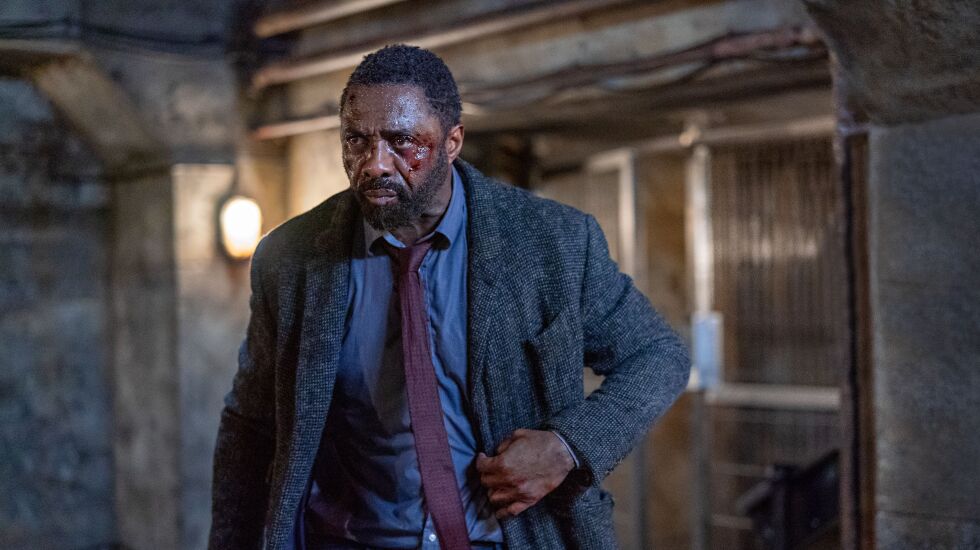
You’d be hard-pressed to find someone who would say, “Yeah, I don’t care for that Idris Elba.” He’s one of our best. What good news it was, then, to hear Elba was returning to one of his most memorable characters: the brilliant but deeply troubled Detective Chief Inspector John Luther, first seen on a 10-episode, two-season series on BBC One in 2010-2011, and then returning for limited-series runs in 2013, 2015 and 2019.
The feature film “Luther: The Fallen Sun” is a continuation of Luther’s saga, and for the first hour or so has the makings of a first-rate noir thriller — but as the body count piles up and the action gets bigger and bigger, even the great John Luther comes perilously close to being overwhelmed by the spectacle in an increasingly ludicrous storyline that favors admittedly stunning and often gruesome visuals in favor of anything approaching plausibility. What starts as an ambitious project striving for the memorable darkness of “The Silence of the Lambs” or “Se7en” turns into something more akin to one of the “Saw” or “Hostel” movies on a bigger budget.
We’re barely past the opening titles for “Luther: The Fallen Sun” when a leaked dossier leads to Elba’s DCI Luther being sent to prison for a myriad of crimes, including breaking and entering, suspect intimidation, tampering with evidence and bribery — “a litany of alleged vigilante activity that critics say attest to a man who felt entitled to take justice into his own hands,” as one TV reporter puts it. Well, yes. He’s Luther.
At the time of Luther’s arrest, he was leading the investigation into the disappearance of a missing teenager — a poor lad who winds up hanged to death in an abandoned mansion along with several other young victims. In an unspeakably cruel twist, the sociopathic serial killer David Robey (Andy Serkis, slick and chilling) has arranged it so the parents of his prey will mistakenly believe their children are alive and will rush to the mansion, only to discover the horrific truth.
This is Robey’s game. He has apparently bottomless financial reserves and a vast network of accomplices who help him as he carries out elaborate and prolonged schemes involving blackmailing, kidnapping, torture and murder. For Robey, the only thing more enjoyable than carrying out his grisly crimes is sharing the details with the loved ones of his victims — and eventually, with the world via the dark web. In Robey’s twisted worldview, it’s society that’s sick because the traditional, basic mores about basic human decency stand in the way of Robey’s grand visions. What an a------.

Robey even finds a way of taunting Luther while Luther is behind bars, which leads to Luther escaping prison in an extended sequence in which he has to fight off about 50 inmates who would love to kill this former copper. On the outside, Luther starts piecing together the puzzle, with the help of his old friend and former boss, the now retired Martin Schenk (Dermot Crowley). Luther also keeps in contact with the by-the-book DCI Odette Raine (Cynthia Erivo), who recognizes that Luther is an investigative genius and reluctantly agrees to letting him help, all the while making it clear she’s going to arrest Luther as soon as he leads them to Robey.
Raine oversees a massive effort to take down Robey (not that they know who he is at this point), with dozens of law enforcement personnel and all sorts of high-tech gadgetry. Alas, this bunch turns up very little, while Luther is pounding Luther pounds the rain-soaked streets of London, inching ever closer to taking down Robey — even coming face to face with the madman in Piccadilly Circus, which turns into a nightmare tableau when people begin leaping from rooftops to their deaths in a mass suicide orchestrated by Robey.
Director Jamie Payne clearly knows how to stage over-the-top set pieces, and the production values are first-rate, but the operatic nature of the action sequences actually undercuts the dramatic tension in some instances. We want to see more of Luther and Robey playing intellectual chess as opposed to Luther chasing Robey, and Robey getting away, and Luther chasing Robey again, etc., etc.
I also have some questions about Robey’s Giant Warehouse of Criminal Activity, in which dozens of employees sit at cubicles, eavesdropping on the lives of thousands of people via their home smart devices, laptops, baby monitors, security cameras, etc., in search of information that can be used for blackmailing purposes: extramarital affairs, embezzling, domestic abuse, gambling problems, racist postings on social media, etc. Who are these minions? Do they commute to work every day and spend the next 8-10 hours digging up dirt on strangers and then go to the local pub? Do they get health care, vacations, benefits? Do they know their boss’s boss is using the information they gather to blackmail and kill people?
This is the problem with “Luther: The Fallen Sun.” We’re asking questions like that instead of enjoying the return of an iconic anti-hero.







